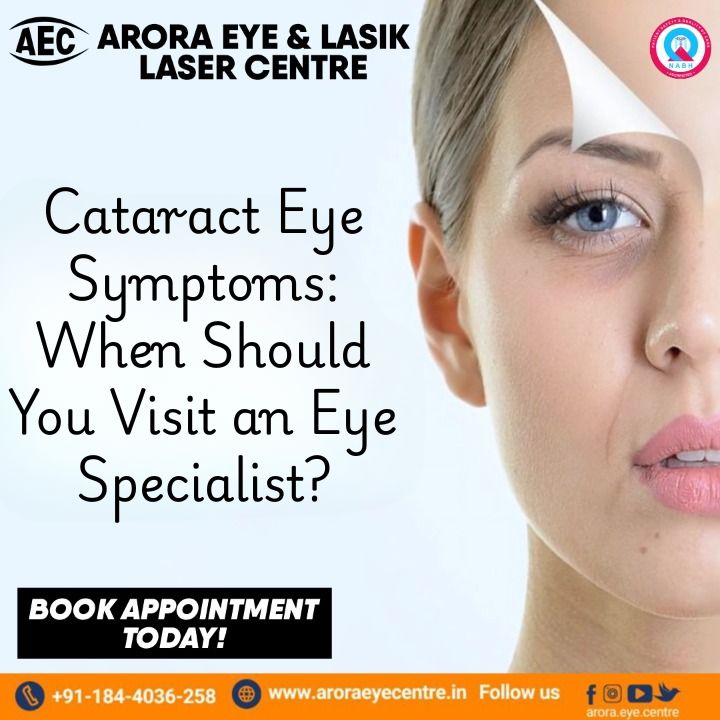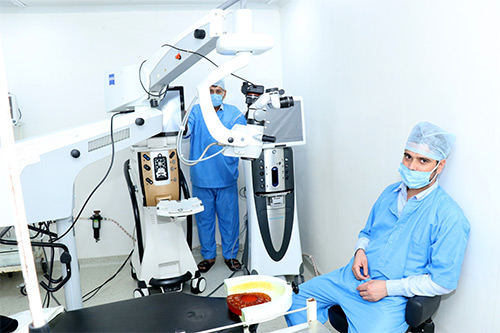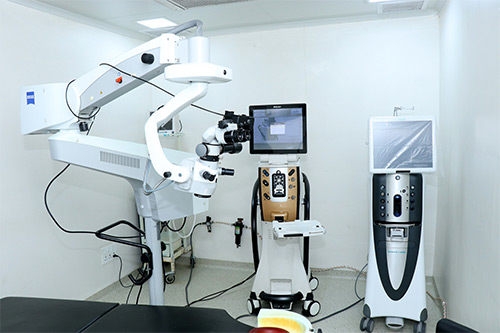
Eyes are one of the most subtle organs of the body, but they are often taken for granted until problems with eyesight begin to impact our everyday lives. One of the gradual conditions affecting millions of people worldwide is cataracts.
Cataracts are among the leading causes of blurry vision, especially in older adults but can also occur in younger individuals due to certain medical conditions or lifestyles. Noticing the Cataract Eye Symptoms early will help to minimize vision loss and provide for effective treatment. In this guide, we will examine what a cataract is, early and late symptoms, risk factors, prevention and when to see your eye doctor.
If you are looking for the best eye doctor near me, the experienced professionals at Arora Eye Centre will be able to assess and manage cataracts with the best diagnostic and treatment tools.
What Are Cataracts?
Cataracts are the result of a cloudy or opaque lens in the eye that is usually very clear, through which the light does not pass on to the retina, thus causing blurred or unsharp vision. The lens functions to focus the light on the retina, so you can form clear images. As the time goes by, mainly because of the aging process, exposure to the sun’s UV rays or specific illnesses, the protein in the lens gradually draws closer and ends up in the formation of areas in the lens which are cloudy and called cataracts. The first stages of cataract development do not show symptoms.
Common Causes of Cataracts
The main cause is age, but there are numerous other factors that might contribute to the development of cataracts. Some of them are:
- Long-time exposure to the sun without properly protecting the eyes with sunglasses that have UV protection.
- Diabetes or other diseases that are connected to the eye or are a result of metabolic disorder.
- Smoking or too much alcohol.
- The sustained use of steroids.
- Eye operations or accidents.
- A positive family history for cataracts, a factor that might be linked to genetic predisposition as well.
By recognizing these factors, doctors can early on view the situation as a possible risk factor and consequently refer the patient to an ophthalmologist near me for regular check-ups.
Early Cataract Eye Symptoms
Symptoms may not be very clear in the beginning when cataracts develop. Still development of the disease certainly brings about the changes to sight. The following are the early cataract eye symptoms one should not disregard:
Blurry or foggy vision:
Things can appear as though you are viewing them through a window that is fogged up.
Light sensitivity:
Bright lights, sunlight, or even headlights from a car can seem too bright or cause glare.
Trouble seeing clearly at night:
Low-light conditions become more difficult, and you may feel unsafe when driving at night.
Halos surrounding lights:
You may see halos or rings around light sources, especially at night.
Colors may look dull or yellowish in your vision:
The things around you may not appear as bright in color as they used to, or it may look faded or dull.
Frequent need for prescription updates:
Signs of a possible change in glasses or lens prescription can be that you keep wanting to change your prescription lenses sooner than expected.
Seeing double when looking through one eye:
A significant indicator of double images or “ghosting” through only looking at an object through one eye, is a symptom you might encounter.
These Cataract Eye Symptoms gradually develop, and this is why having regular eye exams at a reputable clinic such as Arora Eye Centre is important to have early detection and treatment.
Advanced Symptoms of Cataracts
If not treated, cataracts can advance over time and greatly impact your ability to do day-to-day activities. Advanced symptoms include:
- Severe blurry vision that can no longer be improved with glasses.
- Loss of contrast sensitivity – the ability to tell colors and patterns apart has worsened.
- A white or grayish appearance in the pupil – a cloudy center of the eye is seen.
- Increased glare and decreased night vision – decreased light sensitivity has made driving dangerous.
At this point in time, the eye doctor will likely recommend removal of the cataract.
When to See an Eye Doctor?
Most people wait until their eyesight is severely affected before going to an eye professional. Early visits will save your eyesight with the proper treatment.
- You should schedule an appointment with an eye doctor if:
- You are experiencing any of the Cataract Eye Symptoms mentioned earlier.
- Your vision suddenly becomes cloudy or blurry.
- Colors appear faded or washed out.
- You have trouble with night driving or reading small print.
- You notice eye pain or redness associated with vision changes.
The doctors at Arora Eye Centre recommend regular eye checkups every year for adults above 40, and more frequently if you have diabetes, hypertension, or a family history of cataracts.
Cataract Diagnosis
Cataract diagnosis requires several painless tests that include the following:
- Visual acuity test: This determines how well you are able to read letters at a distance.
- Slit-lamp examination: This allows the physician to look at the lens with high magnification
- Retinal examination: After dilating pupils, the retina is examined to check for other eye diseases.
- Tonometry: Since cataracts put the eye at risk of glaucoma, measuring intraocular pressure is the only way to rule it out.
These diagnostic procedures help determine the type, location, and severity of the cataract.
Cataract Treatment Options
In the early stages, treatment could involve stronger glasses, a magnifying lens, or additional lighting to help improve vision. But as a cataract increases in size, surgery will be your safest and most effective treatment option.
Cataract Surgery
Cataract surgery is a procedure that removes the cloudy lens from your eye and inserts an artificial intraocular lens (IOL). Cataract surgery is considered very safe, done quickly, and has an excellent success rate. At Arora Eye Centre, we offer modern cataract surgery techniques using phacoemulsification and laser assisted-cataract surgery for quicker recovery and optimal result.
Read more about choosing the right specialist for your vision: How to Choose the Best Cataract Surgeon for Your Eye Health
Cataracts vs. Other Eye Conditions
It is not uncommon for cataracts to be misdiagnosed as vision problems due to refractive errors or the retina. It’s important to differentiate between the two.
For example, If you notice your vision is blurry, but also experience sudden flashes or spots floating in your vision, that may not be a cataract, but rather a retinal issue which requires immediate attention.
For refractive error or if you simply want to get rid of your glasses, Lasik Surgery is another popular product offered at Arora Eye Centre, but this laser vision correction is focusing on refractive errors in the cornea, as opposed to cataracts. Furthermore, squint vision treatment is also an offered service provided at this clinic for patients that have deformities in alignment of their eyes.
Cataract Prevention: Simple Strategies
Just because cataracts are closely related to age, there are still some things you can do to prevent them from happening sooner or later:
- Wear sunglasses that shield you against UV rays while outside.
- Eat a well-balanced diet that is full of antioxidants, vitamin C, vitamin E, and green leafy vegetables.
- Refrain from smoking and keep the drinking of alcohol to a minimum.
- Manage diabetes or other long-term health issues.
- Definitely get your eyes checked and that too from a top-notch clinic like Arora Eye Centre.
- Take enough fluids and keep the eyes clean.
Why Choose Arora Eye Centre?
The Arora Eye Centre is recognized for providing advanced eye care services using modern diagnostic methods and advanced surgical technology and equipment. The specialists personalize the service whether it is to identify an early cataract, or if it is Lasik Surgery, or if you have a squint eye.
- A few highlights are:
- Specialized, experienced ophthalmologists operating state-of-the-art equipment.
- Comfortable, hygienic, and friendly doctor/patient attention.
- Affordable pricing and ethical treatment approach.
If you’re searching online for the best eye doctor near me, your search ends with Arora Eye Centre, where expert care meets compassion.
Frequently Asked Questions (FAQs)
1. What are the early signs of a cataract?
The early cataract eye symptoms are cloudy vision and/or blurry vision, increased glare sensitivity, and trouble seeing at night.
2. Do cataracts go away without surgery?
No. Once a cataract forms, it does not go away on its own. Early symptoms can be treated with glasses until surgery is needed.
3. Is it painful to have cataract surgery?
Cataract surgery is nearly painless. Local anesthetic is given and most people feel only mild pressure during this procedure.
4. How long does it take to recover from cataract surgery?
Most people recover in a few days to a week, but it may take a month to heal completely depending on other health conditions.
5. Do cataracts return after surgery?
No, the cataract does not come back. However, a phenomenon called posterior capsule opacification (PCO) can happen and is treated easily with a laser process.
6. At what age do cataracts begin to develop?
Cataracts typically begin to develop after age 40, but you will start noticing symptoms after age 60.
7. Can cataracts be prevented by changing lifestyle factors?
Certainly, by wearing sunglasses, diet, and not smoking you may delay cataracts being formed.
8. Can cataract surgery correct other vision problems too?
Yes, many modern intraocular lenses used in cataract surgery can also correct nearsightedness, farsightedness, and astigmatism.
Conclusion
Cataracts are a natural part of aging, but with timely detection and treatment, vision can be fully restored. Knowing the Cataract Eye Symptoms early helps you act before vision loss becomes severe. If you or a loved one are experiencing cloudy or blurred vision, visit Arora Eye Centre — a trusted destination for complete eye care, including Lasik Surgery and squint eye treatment.
Seeking the care of an expert for your eyes is imperative hence do not put off till the symptoms worsen. To safeguard your eyesight for a long time, book an appointment now and get the consultation from the best eye doctor near me at Arora Eye Centre.






